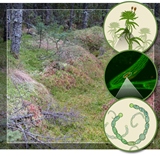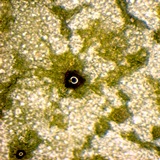The Metabolomics and Bioconversion group performs multidisciplinary R&D for the Department of Energy's (DOE) relevant applications including the characterization of plant biomass and microbial cultures that are potentially suitable for biofuel production.
The group consists of researchers and support personnel that apply expertise in metabolomics, plant physiology, microbiology, biochemistry, chemistry, chemical engineering, spectroscopy, and physics. These disciplines are integrated to determine the phenotypes of native and genetically-modified (transgenic and cisgenic) perennial dicots and monocots that are suitable biomass crops, including Populus, Eucalyptus, Agave, and Switchgrass (Panicum). The aforementioned metabolomic analyses are additionally coupled with genome-wide association studies to identify gene function, and are applied in plant-microbe interactions to determine the basis of symbiotic and pathogenic relationships, and the nature of signaling between organisms.
The group's role in bioprocessing research includes investigation of the use of microorganisms, microbial consortia, and microbial enzymes in bioenergy research to determine how efficiently cellulolytic, fermentative, and exoelectrogenic microbes degrade and process plant biomass to biofuels. Group members combine molecular dynamics simulation and neutron scattering experiments to understand changes in lignocellulosic biomass during pretreatment.
The group is involved in multiple projects within the DOE Office of Science, including
- ORNL-led BioEnergy Science Center
- Plant-Microbe Interfaces Science Focus Area
- Crassulacean Acid Metabolism (CAM) Biodesign Project
- ORNL-led Mercury Science Focus Area, which is focused on understanding the biogeochemistry of trace metal contaminants in environmental systems from the molecular scale to field scale.
DOE Office of Energy Efficiency and Renewable Energy-funded research, including
- Microbial Electrolysis Cell Development and Demonstration
- Microbial Environmental Remediation, which has placed ORNL in a leadership position regarding the use of bioelectrochemical systems for waste and process water upgrading while producing hydrogen/electricity.


